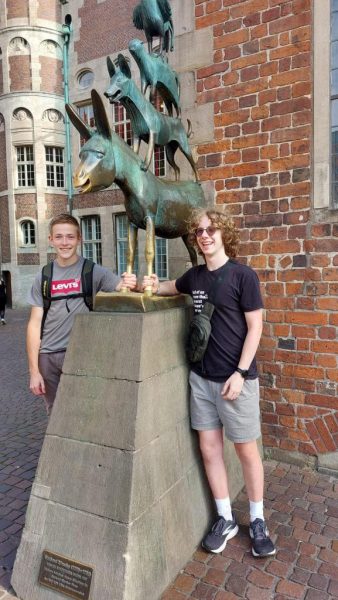It’s a new school year. You expect to see all of your friends again, get some new supplies and maybe take some harder classes. However, for students like Trexler Townley Bakewell (11), this school year could not be any more different; Townley Bakewell is currently living in Germany, participating in a study abroad program.
As part of the Congress-Bundestag Youth Exchange (CBYX) program, Townley Bakewell will be going to school and living in Germany until mid-June of next year. Specifically, Townley Bakewell is enrolled at the Gymnasium Horn high school in Bremen, Germany. CBYX offers several benefits to its participants, such as immersing oneself in German culture, building foreign connections, learning the German language, and meeting with U.S. and German government representatives.
“[The program gives] a full-ride scholarship for a year — they send you to a German high school — to build connections with Germany [and] to build a closer relationship between the U.S. and Germany,” Townley Bakewell said.

Overall, study abroad programs are quite popular among U.S. institutions for a variety of reasons, including cultural immersion or the simple desire to “see the world.” For many, the idea of building relationships and interacting with those different from oneself is an appeal of studying abroad as well.
“I wanted to make friends, have new experiences [while in Germany], expand my horizons [and] connect with people in a totally different part of the world,” Townley Bakewell said.
Townley Bakewell’s legal family, who still lives in America, are not allowed to visit Germany as a rule by CBYX in order to maintain Townley Bakewell’s immersion. However, his foster family has made many efforts to ensure that he feels welcome in his new environment.
“I have [toured the city],” Townley Bakewell said. “My host mom and brother went and toured/biked around the city over the last couple weekends, [and we went around] the town square, famous buildings, the waterfront [and] traditional sites.”
As he entered Germany with practically no connections outside his host family, one challenge for Townley Bakewell has been making friends with his German peers. However, as a result of efforts made by both himself and his foster family, he has been able to find a community for himself.
“My host brother was a huge part of [making friends],” Townley Bakewell said. “People are curious about you, so they talk to you. Sometimes you can tell [if people are nice] if they smile at you.”

When Americans picture the ‘average German,’ they may imagine a humorless, cold and disciplined person. While some elements of this stereotype may ring true in certain aspects of German life, Townley Bakewell has found that many of them are largely untrue.
“I think I thought everyone here would be always conforming to stereotypes: very punctual, very ‘this is how we do this,’ but it turns out the younger generation, especially, are not like this,” Townley Bakewell said. “I think that people [in Germany] are quieter than they are in the States, but [it is] not how I expected it to be.”
However, of course, stereotypes go both ways. The ‘typical American’ as seen by some Europeans is often a boisterous, gun-obsessed, unhealthy Southerner. Naturally, then, many of Townley Bakewell’s German peers were curious about the truth of such stereotypes.
“[I have been asked if] I have a gun, if I support Trump,” Townley Bakewell said. “There’s a big stereotype of every American having a gun, American schools having parties — I’ve [also] had some questions about beer pong.”
An unignorable aspect of CBYX for many is the language barrier. For example, many of Townley Bakewell’s classes are in German and written texts are fully in German. However, many German people know English, so Townley Bakewell is still able to comprehend many aspects of his experience — even without a complete understanding of German.
“I knew a little German beforehand, [and] I did Duolingo pretty vigorously before I left,” Townley Bakewell said. “Then, I had four weeks of language camp. I was expecting to be more immersed than I have been [as] people over here speak incredible English and want to practice their English.”
For the average American high schooler, extracurriculars can play a major part in their academic career. American students are often involved in multiple clubs, sports teams and other student organizations; by contrast, German schools put far less emphasis on these aspects of a student’s school life.
“[As] a whole, extracurriculars are less mainstream over here,” Townley Bakewell said. “Schools tend to not really have sports attached to them. You can’t walk on to a sports team like you can in America.”
Furthermore, America and Germany have several cultural differences. For example, Germans are socially pressured to recycle more than Americans are.
“[German culture] certainly is more group-focused than in the States; [there is] an expectation that you do things for the good of the community,” Townley Bakewell said. “[You] recycle a lot more here, pay higher taxes, [and it’s] a lot more frowned upon to litter [or] speed [on the road].”
Currently, Townley Bakewell plans to continue both his time in Germany and his immersion. He encourages his peers desiring an abroad experience to apply to CYBX.
“I would say that this has been a really cool program for me so far,” Townley Bakewell said. “Apply. You can do the program up until you are 24.”



































